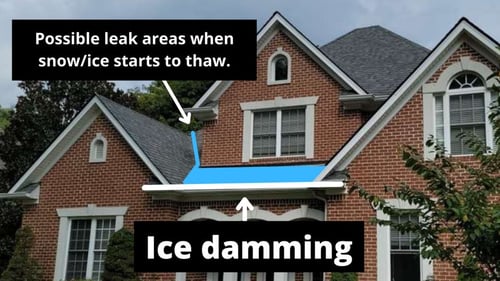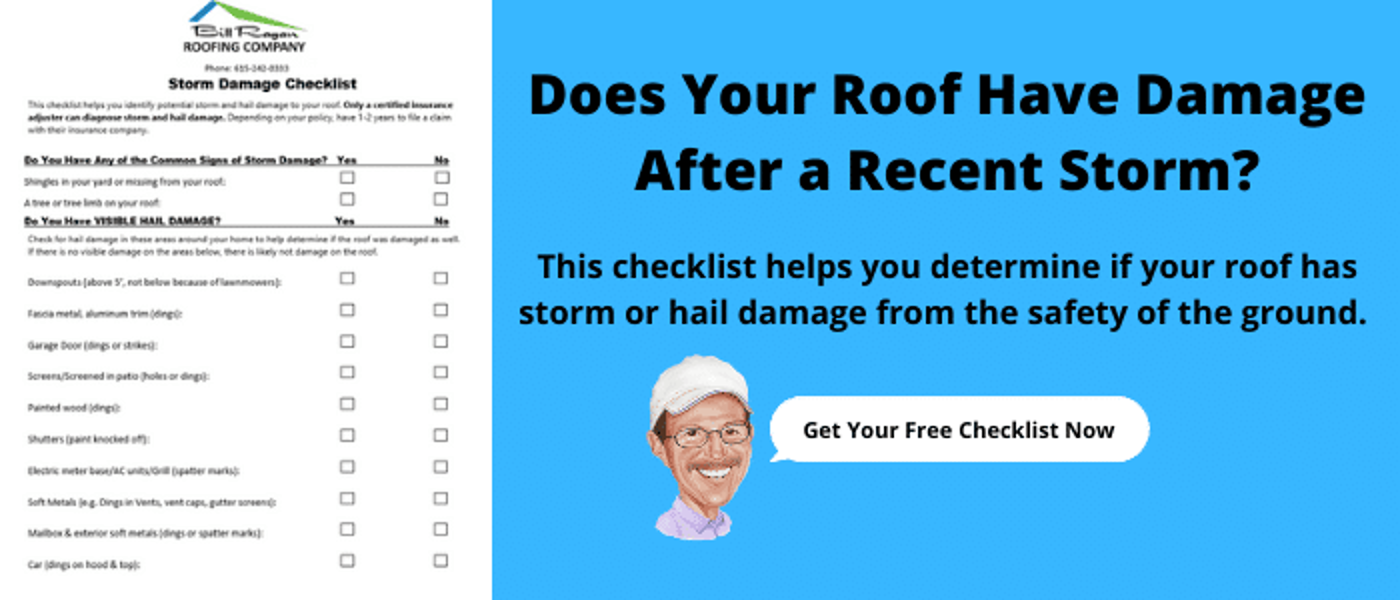Your roof is made to withstand years of exposure to the elements. However, this constant exposure impacts your roof’s lifespan.
This is especially true for extreme weather like straight-line winds and hail during severe thunderstorms. But what about winter weather, like snow and ice?
This is a common question, but it’s not usually asked until snow is already on the roof. Unfortunately, this is already too late.
For over 30 years, the team at Bill Ragan Roofing has helped homeowners like you understand how weather impacts their roof. Because of this, I’ll break down how snow and ice directly impact your roof.
This article covers the following:
- How snow impacts your roof
- How ice impacts your roof
- 3 ways to prevent roof damage caused by snow and ice
How does snow impact your roof?
The biggest way snow impacts your roof is leaks. When the snow on your roof melts, excess water can find its way through the path of least resistance and end up getting into your walls and ceiling.
Not only does this let water into your home, but the excess moisture can also cause mold and mildew to form. Another way that snow impacts your roof is the weight it adds.
Packed snow is heavy and can weigh up to 30 pounds per cubic foot. This weight puts enormous pressure on your roof if the snow sits for days (even weeks) until the weather is warm enough to melt it.
As this pressure builds over time, cracks and breaks on your roof and gutters can form. Depending on the condition of your roof decking and rafters, the snow’s weight can lead to structural damage in weak spots.
You probably won’t experience these problems every time it snows. But it's more likely to happen if you live in an area with heavy annual snowfall.
How does ice impact your roof?
While snow and ice go hand in hand, ice impacts your roof differently. The main way ice impacts your roof is when ice damming occurs.
-1.jpg?width=500&height=499&name=IceDamming(2)-1.jpg)
Ice damming is the main cause of roof leaks when there’s snow and ice. An ice dam forms when snow and ice freeze at your gutter line (eaves), creating an ice blockage (dam).

When the snow above the dam starts to thaw, the water isn’t able to drain properly into your gutters. This backs up in areas that aren't meant to handle sitting water and eventually finds its way into your home.
Another way ice impacts your roof is when excess water seeps into cracks and freezes. As the water starts to freeze, it expands, which puts stress and pressure on your roof.
This creates potential leaks when the frozen water starts to melt in those areas. Over time, you may notice larger cracks forming or find that the structure of your roof is compromised the most ice your roof is exposed to.
3 ways to prevent roof damage caused by snow and ice
Now you know how snow and ice impact your roof and the problems with it. But is there a way to get in front of potential issues when there’s winter weather?
Let’s break down how to prevent roof damage caused by snow and ice.
1. Get a roof inspection
The easiest way to prevent roof damage caused by snow and ice is by getting a roof inspection. It’s recommended to get a local roofing contractor to inspect your roof every year, especially before the winter months.
Not only will they check for any damage and take care of any potential issues, but they will also provide advice on protecting your roof from snow and ice in the winter. Just know a roofing contractor can’t stop or prevent problems from ice damming when it’s already happening.
It can only be prevented when getting a roof replacement and these preventive measures must be done during the installation. However, a roofing contractor can come out after it thaws to ensure your roofing materials weren’t compromised by the ice damming.
2. Invest in tools to remove snow or ice
The next way to prevent roof damage caused by snow and ice is by investing in removal tools. Specific roofing tools, such as a roof rake, remove snow from your roof safely and efficiently.
This relieves the pressure and weight on your roof to keep it clear so you can avoid potential leaks. Before purchasing and using tools, it’s important to research to ensure the tools are right for your roof and you won’t cause any further damage.
Now, you may see some people on their roofs trying to use a shovel or rake to get the snow/ice off their roof. This is not a good idea, and no roofer or expert should recommend it.
Not only is it a huge safety risk, but you’ll most likely cause damage to your roof. This damage could cost you a lot of money to repair or lead to a full roof replacement if the damage is extensive.
3. Make sure your gutters are clear
The last way to prevent roof damage from snow and ice is to make sure your gutters are clear. This helps minimize blockages to allow excess water when the snow melts to drain from your roof.
So, it’s a good idea to make sure your gutters are clear from debris when you see a winter weather event in the forecast before the snowflake falls. The best way to do this is by getting annual roof maintenance.
This not only ensures your gutters are clear during the winter, but it’ll also prepare your roof for the snow and ice. But it’s not just during the winter; you should keep your gutters clear of debris throughout the year.
Can roofing work be done in the winter?
Now you know 3 ways to prevent roof damage caused by snow and ice. You should contact a local roofing contractor as soon as you notice potential problems from snow accumulation on your roof.
Unfortunately, most homeowners avoid contacting a roofer until it’s warmer outside. This is mainly because they don’t know if roofing work can be done during winter.
While I get the logic, the last thing you want is for a small problem to turn into a big one because you waited until the season changed. That’s why I wrote another article to help you understand what kind of roofing work can be done in the winter and the circumstances when it’s a good idea.
Since 1990, the team at Bill Ragan Roofing has provided high-quality roofing services to homeowners in Nashville and surrounding Middle Tennessee areas. No matter the season, you can count on a rare experience in the roofing industry when you work with us.
Check out Can Roofing Work Be Done In Winter to learn what kind of work a roofing contractor can do during the winter months.



